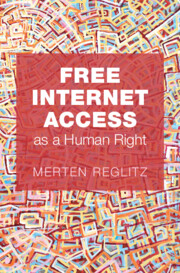Book contents
- Free Internet Access as a Human Right
- Free Internet Access as a Human Right
- Copyright page
- Dedication
- Contents
- Acknowledgements
- Introduction
- Part I Justifications
- 1 Human Rights as Protections of a Minimally Decent Human Life
- 2 Derivative Rights and Linkage Arguments for Rights
- 3 Internet Access and Civil and Political Human Rights
- 4 Internet Access and Socio-economic Human Rights
- Part II Obligations
- Bibliography
- Index
4 - Internet Access and Socio-economic Human Rights
from Part I - Justifications
Published online by Cambridge University Press: 15 November 2024
- Free Internet Access as a Human Right
- Free Internet Access as a Human Right
- Copyright page
- Dedication
- Contents
- Acknowledgements
- Introduction
- Part I Justifications
- 1 Human Rights as Protections of a Minimally Decent Human Life
- 2 Derivative Rights and Linkage Arguments for Rights
- 3 Internet Access and Civil and Political Human Rights
- 4 Internet Access and Socio-economic Human Rights
- Part II Obligations
- Bibliography
- Index
Summary
This chapter provides additional justifications for the human right to free internet access. It shows that today internet access is practically indispensable for having adequate opportunities for the exercise and enjoyment of socio-economic and cultural human rights. Examples from around the globe provide evidence for the internet’s practical systemic indispensability for human rights to, for example, education, health care, housing (adequate standard of living), finding work, and participation in cultural life. Specific attention is paid to the differing ways in which internet access matters in developed countries (where internet access is already widespread and public services generally available) versus developing societies (in which internet access is often lacking and universal public service provision is precarious. In developed countries, internet access greatly increases opportunities to use socio-economic human rights, thereby putting those who involuntarily remain offline at risk of social, economic, or cultural exclusion. By contrast, in developing countries internet access is sometimes the only way for at least some realisation of people’s socio-economic human rights.
Keywords
- Type
- Chapter
- Information
- Free Internet Access as a Human Right , pp. 106 - 138Publisher: Cambridge University PressPrint publication year: 2024

